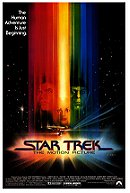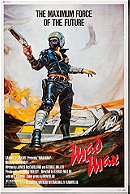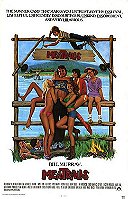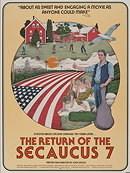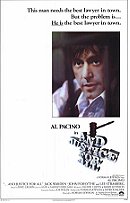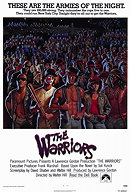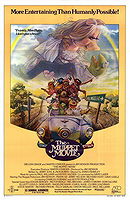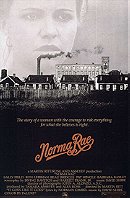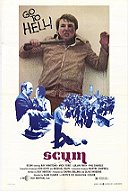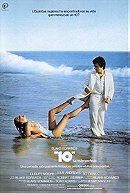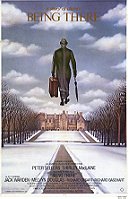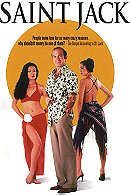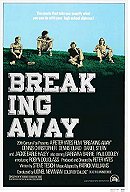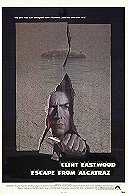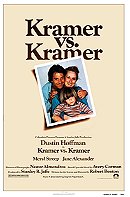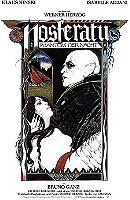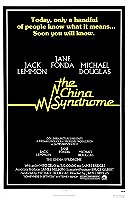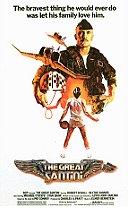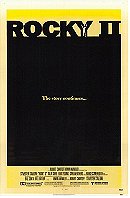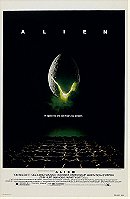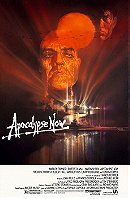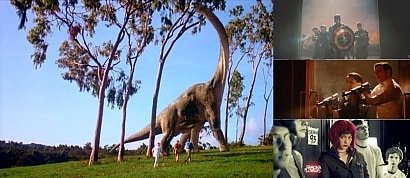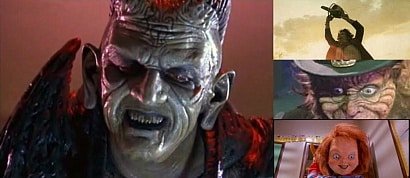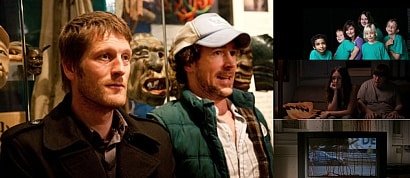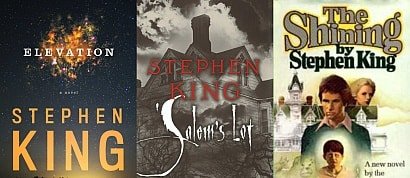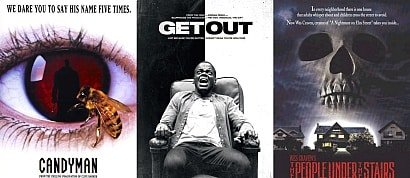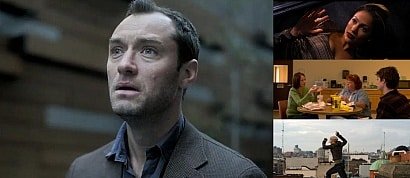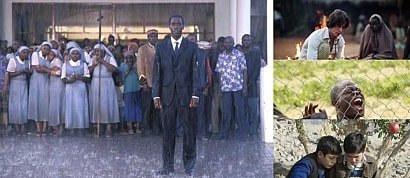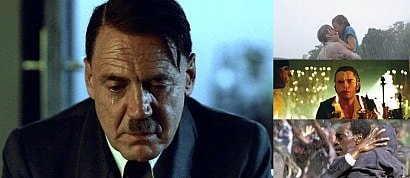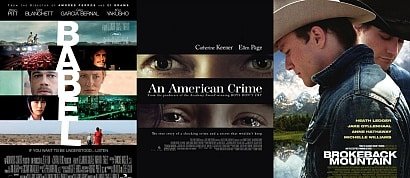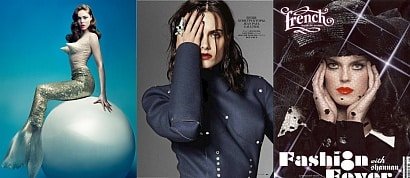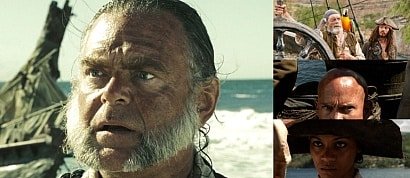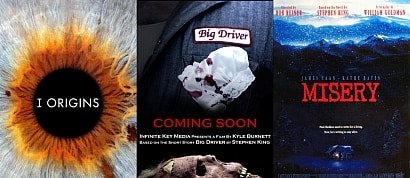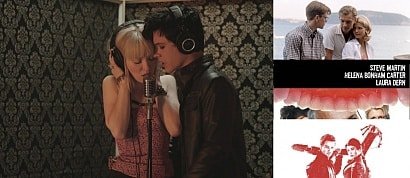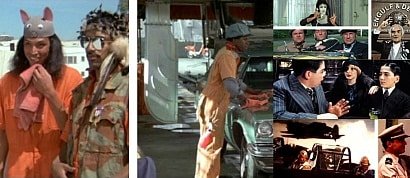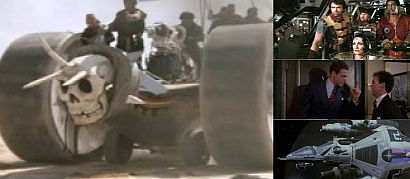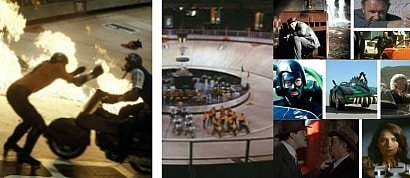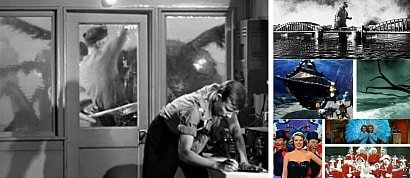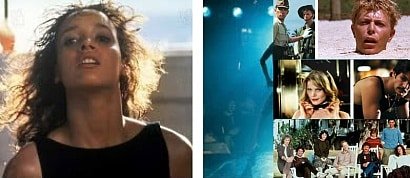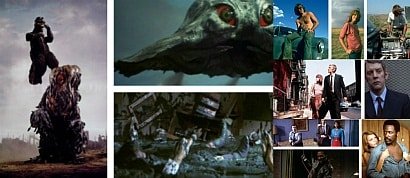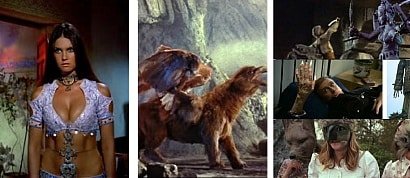25 From 79: My Favorite Films Of 1979
Some even had the fearless nerve to delve into sinister scenarios that actually occurred. The line between "real life" and "reel life" was becoming blurred to the point almost being undetectable. While the Satanic possession of a 12-year-old girl in The Exorcist may have very "loosely based" on actual events, the horror that supposedly occurred in the now infamous house in Amityville was supposed to have actually happened. At least, that's what the movie's marketing team worked diligently to try and make everyone believe. And to be quite honest, that was the reason that I agreed to pile into one of my friends' mom's station wagon and go watch this cinematic phenomenon that was sweeping the nation at the time.
So, even though The Amityville Horror doesn't have the highest rating when it comes to true quality horror flix, it's one of those that does hold a special place in my heart for the feelings of nostalgia it evokes whenever I watch it.
And for now, that's enough for me to include it on this list.


This 1979 big screen reunion of the original cast in a full feature length premise was the end result. And okay, so maybe the very first motion picture update of Star Trek isn't the most exciting sci-fi film ever, and not even the best of the Trek franchise. But as someone who wasn't a fan of the TV show, for me it was kinda cool to see it updated onto the silver screen with the kind of blockbuster budget that was now bringing science fiction to the fore and making them viable film franchises, the likes of which movie-goers had never seen before.
Maybe a part of it was because I was caught up in the types of space operas that Star Wars was making so red hot at the time, or maybe it was just because I could feel that I was in the middle in a new chapter that the world of cinema was going through, in which Hollywood was now taking all those TV shows who potential were limited by the television budgets and expanding them with the new special effects and wide screen dollars that allowed these concepts to boldly go where no man had ever gone before. But whatever the reason, Trek: The Movie was the kind of movie that made me feel excited to be sitting in the dark with a bunch of fellow film fans and enjoy the adventures that were unfolding before us on the screen.
Besides, this was the motion picture that did eventually lead up to the Wrath of Khan, The Voyage Home (my personal favorite of the entire franchise) and, of course, the awesome 2009 "reboot". All of which demonstrated that the franchise of Capt. Kirk and crew now had a new future ahead of them, one in which would allow them to truly live long and prosper.
All that said, at the same time, this is, in the end, the flick that introduced the character who would eventually become one of the most bad-ass personas to ever race across on the big screen. And it is the story that provides a look into what it was that "drove" the "Road Warrior" during his "pre-post apocalyptic" days.

So, even though, on its own, it is still a solid dystopian story about the not so far flung future, I don't even have to go into further detail as far as describing this Mad Max, other than to just to give it major props for being the first chapter in the saga of one my favorite cinematic characters ever.

When I was going through that life-defining period that we share at one point or another known as adolescence, there two very spicy things that I loved to consume regularly.... meatballs and Saturday Night Live.
Whether they're on appetizer sticks, in a sandwich, on top of spaghetti or in the form of a movie, I really do like me some meatballs.
As far as SNL, the very first two seasons are and always will be my favorite. And as this movie makes pretty obvious, my favorite Not Ready For Primetime Player was Bill Murray. Therefore, knowing that this movie was going to be his big screen debut, I was really looking forward it. And after my initial viewing, I knew instantly that I liked me some Meatballs.
Now back during this time, which was the late 70's and early 80's, summer camp was a very popular theme with teenage-targeted flicks. And TBH, even when I was sophomore, I normally found this particular brand of humor as just plain sophomoric. But, directed by Ivan Reitman and starring Mr. Murray, Meatballs, despite its theme, didn't go down the low road that we were used to seeing from this kind of comedy.
The story itself was pretty lightweight, but with his laid-back approach to both his humor and his acting, Bill added the kind of poundage that was needed to make me smile that same kind of smirky smile that he himself always seem to carry on his face, whether he was doing a skit, a movie role or simply conducting an interview.


It may be an obvious opinion, but I think the success of both this movie and Chill are the natural result of a generation who are still somewhat scarred by the turbulent 60's but now have now accumulated enough distance and perspective to try and come to terms with the after-effects, to themselves personally and to the society in which they live in. This is a kind of catharsis that needed to happen, not just in the entertainment medium, but just all aspects of the American society during the time that this movie was released. And I believe that that explains why Return of the Secaucus Seven was followed by such a similar themed movie like The Big Chill only four years later, which in turn was followed three years later by a TV show called "Thirtysomething", which covers a lot of similar themes about the adult mindset trying to adjust and work within the everchanging world around it. Because like all forms of catharsis, it's an ongoing process, one that often requires more than just one "session" before one can truly feel heeled, or at the very least, able to move on.
The good news is, that when written and approached the kind of integrity that this kind of subject matter needs in order to be a viable form of entertainment, you really end up getting some pretty good stuff, like this movie, which reminds one that being all grown up doesn't mean you have to stop growing.
Yeah, as much as we've all evolved as humans, one look at the justice system, in any country anywhere, and it almost always shines as a blaring example of just much further we all still hafta go.
But the truth of it is, the hard truth, is that it is the best that we've got.
Both sides of the ruling of what the justice system is and what it represents is no better demonstrated than in the fiction that we write about it. Particularly (and fortunately, for the purposes of this list) what we write about it in the movies.
It always takes a certain amount of intellectual acumen and wit, not to mention some moral aptitude, in order to be able to present an effective court drama. One that teaches the viewer something, makes him/her think, but above all, holds onto their attention by providing some degree of entertainment value.
There have quite a decent amount of films that have done this, but for this entry, the one that is the focus in this discussion is "...And Justice For All". And aptly titled movie considering not just the genre of the movie but also the overall subject about the system. Written by Barry Levinson and his then wife, Valerie Curtain, the script was nominated for Best Original Screenplay at the Academy Awards for that year, which I guess means that it was pretty good. Me personally, I'm no expert, but I liked the way it covered the concepts that it did, and the way that it juggled so many characters and their situations, every one of which was seemed to be a representation of flawed everyone involved in the system can be (even a judge), and why rising above our own flaws is the only hope we can have in making sure that courtroom proceedings of all kinds work to the advantage of the justice that it is built to obtain. The actors in this cast are the typical usual suspects that we expect to see in well-written melodrama of the period, with each one providing the kind of personal investment required for their respective roles. Al Pacino, in particular, demonstrates why we was the fiery rising star at the time by delivering a final scene that will become one of the famous movie quotes of all time, and demonstrating signs of his over-the-top type of yelling acting that will become his tried-and-true signature during the latter half of his career.


Back in the mid 70s, when Steve Martin first broke out into the comedy scene, I gotta say that, honestly, unless he was on SNL doing some sort of skit, I didn’t find them to be particularly funny. His style of comedy back then seemed to be aimed at the more the unintellectual fraternity boys who were on campus more to party than they were for any kind of scholastic reasons. I know that sounds more contradictory to the long career that he has been able to establish since then, but if you look at those early films that he starred in (some of which she even wrote), there is not really all that much that is funny there other than a guy who is willing to "go out there" in order to make people laugh. In short, he seemed to be a poor man’s Jim Carrey, but without all the wit, or just plain straight up humor, that Jim was able to convey via his physically elastic talent.
Obviously, this is my way of saying that I didn’t like much of his early cinema work, which does include this movie, The Jerk. But alas, my change of heart sort of evolved since back when this movie was first released in theaters and I don’t know if it’s because of some sort of sense of nostalgia or because the mellowing that comes with age, but slowly and surely, Steve as a Jerk began to grow on me. The crass humor that I shunned before now seems very lightweight compared to the edge that today’s comedies which tend to proudly display a badge of cringe as a methos to evoke laffs from their audiences. Martin's reputation as the nice guy in his later movies, particularly as the anarchistic, father in such films as Parenthood, Cheaper by the Dozen, and of course, Father of the Bride, have given him a genuine likability that has accumulated over the years and in my eyes at least, made me look at his younger self through a much softer lens. Therefore, when I see him here as The Jerk, I realize that the word that is the basis of the title of this movie, is defined more from its old-skool definition of a dumb guy who doesn’t know any better compared to the more modern translation, which is usually more towards someone who goes out of his way to be not a very nice person.
That doesn’t mean that this movie has gotten to the point now where it’s for everybody, especially since no comedies really are, but it is worth giving a looksee to see if how much of Steve’s arrow through the head approach to comedy will be enough to make you react with indifference or react as one wild and crazy guy.
"Can you dig itttt...!!??"

But then, one day, at the beginning of the New Millennium, I came across a series of old episodes of Siskel & Ebert on the internet. And one of the episodes was the one that featured a rating for this movie. In it, both critics absolutely loved it, to the point where they both listed it as one of the best films of 1979. So just based on their reviews, I decided to search the movie and see just how good it really was, especially now that I was much older, and I knew I would be able to watch it with the kind of objective, more open-minded attitude that would be required to watch a movie about a boy and his horse.
And wouldn't you know it, my older self did indeed find this story as heartwarming and "enchanting" as its reputation claimed that it was.
After a massive shipwreck (depicted magnificently with just the practical effects available at the time), a young boy named Alec finds himself stranded on a deserted island with a black stallion. The pair are able to form a bond from their shared experience of calamity, and it is a relationship that lasts, even after they are rescued and returned to civilization.


When I was in the first grade of elementary school, my parents got divorced. As a result, for a short time, my mom moved me and my siblings in with her sister, my aunt, and her family. This family consisted of one brother and three sisters. This brother was my older cousin and because he only had sisters, when my family moved in with his, he took me under his wing as the younger brother he never had. Because of this, he let me continually hang out with him and his friends who were also his age, and therefore also older than me. This was a circle of buddies who the only thing that they enjoyed more than going to watch a movie at a theater was sneaking in to watch a movie in a theater. And they continually let me hang with them whenever they did this. One of the after-effects of this was that I developed a much more mature taste for films than most kids who were my age at the time. So unlike many kids who were also in their first year of elementary school, I wasn’t a big fan of children’s programming such as Sesame Street. When it came to things like cartoons or puppet shows, I much preferred watching things with a little bit more of a bite to 'em. For example, why most little tykes my age were watching Disney cartoons on the Mickey Mouse Club, I was much more into Warner Brothers and their Bugs Bunny universe (which was well known as being aimed more at adult audiences than it was to more kiddy viewers). And when it came to Muppets, the only time I had any interest in watching them was when they were on The Muppet Show and not on Sesame Street. I’m not sure how dated that show feels like today, but back when I first watched the very first episode, just a few minutes into it, I quickly recognized that it had a much more sly sense of humor than probably even most adults wouldn’t have caught. Needless to say, by the time The Muppet Movie came out, I was pretty happy to hear that my favorite felt friends were transversing from the little screen to the big screen.
And to be honest, it's kind of surprising that it took her that long for her to realize that many people have always liked her. I mean from the get-go. Sally's career began with her being a very likeable teen actor. Her down to earth quality permeated through her pretty looks, her bubbly personality and even though her onscreen talent. It was the combination of those three aspects of her that made TV viewers love as a beach combing surfer chick in Gidget, and then, as the wild and wacky nun who could fly in The Flying Nun (and in case the slight chance that there is there is a young person out there reading this, yes, there was once a series about a nun who fly back in the 1960's... look it up). And it was a niceness that has never left her. All one has to do is look up any interview with on YouTube, and it's becomes quite evident almost instantly what a natural born sweetheart this Mz. Field truly is.
So, what does all this about her likeability have to do with Norma Rae? Well, I think that her affable personality is what sold this movie, to make it the success that it was. Despite being a very high quality drama, the themes that mae up the story are pretty simple. Blue collar workers have rights, trying to blalance work and family, and the wwoman's role in both the house at the factory. This is the kind of stuff that is dependent on the natural tone of the script and the acting talent of its cast. And these are the two aspects of Sallly Field that drive Norma Rae. We believe her both as a person who has very little vision of her role as in the houshold and in her role as a plant manager in the industrial cotton mill. Two things that most women in the country during that period of time had very little exerience in the 70's decade now that dust had settled from the aftershocks of the world-altering of the 1960's.
Here, through Sally's heart in hand performance, we see a woman trying to make sense of two positions in life that she was nowhere near prepared for. Norma has to juggle the job of caring for her kids and her third marriage along with maintaining a job that banks on treating its workers with only the skimmest of human rights. It may be the kind of stuff that awards shows eat up, but it only nets any results if they can get someone at the top of the bill to make it all believeable. And since this type of story has always been a gamble at the box office oofice, that is a trait that must also resonate with movie goers.
Luckily, for Norma Rae and her legacy, Sally Field manages to pull this off, in spades, and finally show the world that after a start as a bubbly waif-sized servant of God with her head literally in the clouds, she now has enough weight to be able to stand in the middle of all of her fellow workers, whether in they be fictional factory workers or as "reel-life" thespian collegaues, and make 'em all finally take notice.

Therefore, if one were to come upon a movie that used a borstal as its centerpiece, chances are pretty good that just liked many other prison themed films, one of the aims of the story would be to depict the kind of corruption and cruelty that occurred within the walls of these institutions of reform behavior. That's has always been a popular formula that filmmakers always liked to inject into motion pictures that featured their primary characters who were serving their time in lock up. To ask the question of which is more evil, the criminals who committed crimes and as a result, landed themselves in such a setting, or the political machinations of the crew who ran the facilities for their own self-serving and dark purposes. It was the inmates versus the staff in a constant struggle between crooks and the crooked staff.
Well, if that's what you want in your prison flix, you shan't be dissatisfied with Scum. This is a in-depth view into just how the borstal system functioned with all of the key players and parts both being wounded beyond what the original intentions of the inventors of such institutions planned for.
Up to the time of its release, Scum was one of the grittiest, realist and bloodiest depictions of a system that was broken from deep within. These breaks began somewhere in between the mindsets of the archaic wardens and guards who were responsible of maintaining order and discipline, to the stilted operations that were created to treat the inhouse delinquents as wretched throwaways who worth were nothing short of mangy mongrels.

A very young Ray Winstone (and when I say young, I mean so young that I can barely recognize him as Ray Winstone) stars as teen delinquent who has been sentenced into a borstal and who uses his abilities as a repeat offender to rise to the top of the pecking order of the inmates. However, despite whatever "power" he gains while in the inside, it becomes quite apparent that, whether it be through the eyes of his fellow offenders, the warden, the guards or even through the eyes of the system itself, it is all hopelessly flawed to the point that he will not be to escape the fact that, ultimately, he is just "scum".

10 was the beginning in a series of date flix in which average joes were now hopeful in their chances with scoring with an uptown girl when the movie was over.
As the 70's decade was winding down, Sellers' career seemed to be lying face down in quite the rut. Almost exactly twenty years earlier he had broken out of a popular radio comedy troupe and into a slew of award-winning films, such as Lolita and the very first installment of the Pink Panther franchise (which was so popular, it even spawned a popular cartoon series featuring an animated anthropomorphic panther whose original intention was just to be a title mascot).
It was career that was going strong and eventually peaked with one of Stanley Kubrick's most well-known work, Dr. Strangelove. To this day, it is considered one of the best films ever made and many attribute Peter's ability to successfully portray three different roles in it as one of the major reasons why.
It was after this that Sellers began his downward spiral with not only his career, but also with his personal life (and as anyone who knows about it, it was a mess).
It seemed as though the only roles that were allowing him any kind of success were the Pink Panther films, and the truth was, even the color that was the basis of those comedies had already begun to fade. But as the saying goes, sometimes, "desperate times lead to desperate measures. And for Peter, that was him taking a "chance" on a role that would either bomb big or win big. Luckily for the multi-character actor, it won big for him. So much so that he even scored an Oscar for his part as a simple-minded gardener who had never wandered outside his employer's townhouse property. In the story of this film, when the employer of a socially inept and slight minded gardener named Cjance dies, he begins a Forrest Gump style journey into a world, where his actions, which are guided by his unusually limited intelligence, get mistranslated by many who meet him. Eventually, this all results in Chance's irregular behavior getting him national attention and soon, he is regarded by the media driven public as some kind of uber-intellectual and spiritual guru.
Now, of course. at this point of the. description, it becomes pretty obvious that Being There is, from top to bottom, filled with some form or another of metaphorical message (oh, and now that I think about it, the title of this film points in that direction also). And while that may turn some people off, the truth is, if you're going to do a movie like this one, that has a layered hidden meaning throughout the entirety of it, the good news is that that meaning is not too far off from the surface. The metaphorical imaging in this plot isn't too abstract so that the audience isn't constantly questioning what the heck it all means., but also, it's not so obvious that it doesn't cause one to think a little bit.
In other words. and I know this is based more on my opinion than critical fact, but this is a story that is quite a satisfactory watch, particularly if instead of leaving it at the door, you're the kind of person that doesn't mind watching a movie with your brain also being there.

In it, Ben Gazzara stars as an American pimp with a heart of gold trying to make his way in the chaotic streets of 1970's Singapore. Having a way with his businessmen clientele, eventually "Saint Jack" has a lifechanging moment in which he begins to question his life and its goals, but never his affable charm towards his customers, his "employees", or just about anyone he meets. Gazzara plays his character of Jack as the role he was always meant to play, and Bogdanovich's script for dialogue swings and swerves to add the right amount of texture that transforms a plot that isn't very thick into a character study overflowing with a sun-charmed script.

Ultimately, Saint Jack is one of those motion pictures that becomes an epitome of an underrated and forgotten gem, probably of the whole decade, and adds one final spritz of the waning New Hollywood flair at a time when that particular filmmaking movement was reaching its retirement years.
Can the working-class sons of Bloomington Indiana, stuck in a "quarry" of adolescence, take advantage of this opportunity to finally break away?

Breaking Away was a movie that had gained quite an amount of fame at the time of its release for the wit and smarts with which it was writ. It took me several years before I finally got around to actually see it based on its reputation as a nice smart little movie. And I think its rep is one that remains true, despite that maybe the passage of time and the advent of popular scriptwriters such as David Mamet has overtaken the sharpness of this movie's dialogue, but only by a nose. It well worth taking the time to watch Breaking Away today and appreciate it's lightweight candor into the psyche of a small Midwest town as it comes to grips with the changing mindset and attitudes that American society is still growing into. It has a combination of a well-drawn cast (including a breakthrough role for Dennis Quaid) and a quick narrative that allows the film to shine with enough of an intelligence and of a down-to-earth homey feeling that's makes it an above satisfactory watch for the even the more discernible modern-day viewer.
For me, BA is an excellent example of film of its time trying to break away (yeah, I'm using that metaphor yet again!) from the reigns of the classic formula for drama that that headed the era of "New Hollwood" and was now racing into the more insightful, deeper delving approach of the upcoming 80's cinema that was just ahead, beyond the ribbon that is the finish line.

So, now, after covering a prison movie about teenage scum from across the pond, we movie to a prison movie about adult dregs from across the bay.
After cementing his status an outlaw of the Ol' West in a buncha westerns both in the spaghetti and straight up genres, and then establishing himself as the outlaw police detective within the police system in a bunch of "dirty" cop movies,
the old Clintster tries his hand at being an outlaw among outlaws within the traditional escapist confines of prison movie. Here in Escape from Alcatraz, as the film title heavily implies, he portrays what appears to have been the very first successful (allegedly) escapee from that most infamous of infamous island prisons, the big rock known as Alcatraz.
To be honest, the role of Frank Morris, one of few men to ever escape Alcatraz, wasn't much of a stretch for Clint, who really just seems to be playing himself. Or at least, the typical tough guy of few words. But the performance serves its purpose of providing the plot a center figure for the audience to root for as the formation and actual enaction are carried out. Rounding out the solid cast are Fred Ward, who once tried his hand as Remo Williams, Patrick McGoohan, famous for playing a prisoner of a different sort, and finally, some droopy face character actor who I remember from an episode of Seinfeld, where he played "another Kramer".
You guys know which actor who I'm talking about...?
that guy.

BTW, for any of you who didn't pick up on the metaphor,
that pic is also a play on words for the title of this movie.
Seriously though, after so many years of old skool Hollywood cranking out one romance film after another, whether they were rom-coms or just straight-up love stories, that eventually, a backlash began to build up among certain filmmakers, which culminated to the "New Hollywood" of "anti-romance" films that dominated the 1970's. Films like Scenes From a Marriage, An Unmarried Woman, and A Woman Under the Influence, focused more on those factors that broke up a romance rather than those that brung them together. Even one particular movie, Annie Hall, which is still regarded as a classic in the romantic comedy genre, since it covered the subject from such an "intellectual" standpoint, it was a demonstration of how the reality of human flaws makes the concept of "happily ever after" such a fictional concepted that lives more onscreen than in real life.
So, it is only fitting that by the time we reach the final year of the 70's, we have a film like Kramer Vs. Kramer. A departure of the romance in its burgeoning stages, it's a story that begins with the disintegration of one instead. Driven by a maturely penned script, and the heavyweight thespian talents of Dustin Hoffman and Meryl Streep, KvK takes a deep dive in the struggles of a family that must cope with the dissolution of what the world of entertainment used to tell us was the foundation of what made the world go round. Not exactly the escapists type of fare that fueled "matters of the heart" movies, but it was one that long overdue.
Movie goers would now get to see that admitting that a marriage was over was not a lonely instance. Couples from all over were learning this the hard way. But now with the Kramers, they would be able realize that this was a scenario that many modern households had to deal with and that they were not alone. Initially, when it was released, the battle of the two K's may have not been an easy watch, but upon a little marinating, it became obvious, that it definitely was a welcomed one.
All throughout the history of cinema, there have been numerous director/actor combos that have become legendary. And one of the most compelling was Werner Herzog and Klaus Kinski. Between 1972 and 1987, these two collaborated in five films and there wasn’t a bad one in the bunch. Some may claim that the reason that their films flare with so much energy was due to their legendary personality conflicts. Personally, I don’t know, but what I do know is that the combination of the visuals, performances and writing of all their collabs are never boring.

Okay, that’s not entirely true. What I actually hate is the formula that much of Hollywood has accepted for making remakes, and what that is, is the idea that if you’re going to remake a movie, the best way to hedge your bets at the box office is to remake a classic movie that was successful back when it was released. Which for me has never made sense since I believe that the only reason that a movie should be remade is because the makers believe that they can do it better this second time around. And obviously, if a movie is considered a classic, then there really isn’t all that much room to insert any improvements into it. And I’m sure that I don’t have to explain how there are very, VERY, few remakes that are an improvement over their original.
All that said, I’m sure it’s pretty easy to see where I’m going now….
Obviously, since Nosferatu the Vampyre is on this list, it’s one of the rare few that are the exception to the rule. I don’t necessarily regard it as being better than the silent version, who's full title was actually Nosferatu: A Symphony of Horror (which, when you think about it, is an ironic title, considering that it is a silent film). But the long title is not the only difference between that one and this one. Naturally, this modern take is a ”talkie”. But also, NtV does not change the name of the corpuscle consuming Count from Dracula to Orlok. Here, the fanged fiend retains the name that was given to him by its literary creator, Bram Stoker.
Directed by the stylishly cinematic talents of German-born auteur Werner Herzog, it's no wonder that the updated Nos pays homage to the original quite faithfully, yet with just enough distinction to stand on its own. Kinski brings his typical energetic and emoting savoir faire to the role of Dracula and ends up with a portrayal that displays Ol’ Drac as a sad creature (I think those in the thespian field call it “pathos”), who truly looks upon at his curse as a curse, even when he dines on the life fluid of a doomed damsel with the same level that is reached in an orgasm.

The talents of the two continually clashing titans here allow Nosferatu the Vampyre to take a few strides away from being just a typical retread, despite being practically the same story as the silent version. Along with the visually rich production that takes advantage of its jump into the more varied areas of the spectrum, it’s a brand-new visual treat of highbrow horror that comes just a natural result of Herzog's direction. More than an updated copy, more than a homage, this is a retelling of the legend of Count Dracula that flows successfully with the blood that is of a different color.
For a movie that was made and released probably about a decade, too late (which most likely explains why the movie didn’t do so well financially), it is pretty obvious upon viewing that this is a motion picture project in which a lot of thought and care was put into almost every aspect of its creation. The cast was very well-chosen, the singing and acting are all cotton, the songs themselves, which were most likely bigger hits back in the 60s than could’ve been expected in the 70s, we’re all performed with a lot of vibrant, energy and enthusiasm. And the production value overall was all very high-quality, which is probably the one aspect that really helped the movie Hair to exceeded it stage play incarnation. This wasn’t just one of the best movies that was released in 1970, but it was also one of the best of the whole decade. Not to mention that it is one of the best musicals have been released by Hollywood ever.

To be honest, despite all the positives that come from a piece of cinematic work that was constructed with the high amount of intrinsic care and solid financial backing, because of the premise, look, and attitude that encapsulates the whole reason why hair was if ever conceived in the first place, at the end of the day, to have been released in the middle of the 1970s, this was a movie that was going to come off as out of date, no matter what. Which is not only the bad news, but it is also the good news about this film. Because, although it would have fit perfectly within the error of the flower power generation of the 1960s. With as much time it has passed since, it really is an entertaining experience for anyone who watches it now. It captures perfectly the atmosphere of the turbulent 60s along with the blinding, sunshiny movement of hope that was trying to counter the culture of that time. But it was made with the kind of perspective which results from distancing from such a fiercely unstable and tempestuous period of American history. It’s almost as if though this movie, despite its lack of box office, was meant to have been made at the time that it was so that it would be a much more satisfactory viewing in the decades that followed.
In other words, there is no better than now to watch Hair, not just as an entertaining movie, musical, but also, as an artistic cinematic examination of the contradiction of war and peace that modern civilization, particularly that in the United States, was struggling to understand, validate, and endure.
That is an explanation of the wording of the phrase for those not in the know, and it's meant to convey just how dangerous and catastrophic such an even would be. And what emphasizes even more, is that this is a possibility that would occur strictly out of the human error of a human construct. Which would make such a grand tragedy even more tragic on an even grander scale.
There are all sorts of points of discussion that would need to be covered in a conversation about this form of manmade energy source with an almost unlimited shelf life, and all the kinds of prices that would be paid for its utilization, but this 1979 nuclear thriller covers the most basic and most obvious of 'em all.
A thriller that relies on conventional yet effective storytelling and on the concept of making the viewer decide which is more scarier:
the idea a nuclear reactor meltdown that can result in the China Syndrome or
the fact that the big corporate mindset is willing to do anything in order to hide from the public the truth that such a cataclysmic scenario is indeed a very real possibility.

A compelling "almost disaster" flick that tackles the issue of commercialism vs. environmental/international safety, topped off with the acting heavyweight trio of Jane Fonda, Michael Douglas and Mr. Jack Lemmon.
In "reality", the Great Santini is named Wilbur "Bull" Meechum, with the Santini nicknamed being something that he inherited from his father. In a slight bit of coincidence, the second Santini is portrayed by Robert Duvall, who also played a similar single-minded machismo type of character (albeit one within a war and therefore, with a "purpose") in another "great" piece of cinematic drama called Apocalypse Now. However, unlike in that movie, his non-distaste for the smell of napalm in the morning is one that he never really gets to experience, along with any kind of combat experience that he yearns for more than even for the emotional stability of his own family. It seemed as though the entirety of the 70's decade was filled to the brim with how war, particularly, the still freshly finished Vietnam War, impacted the hearts, minds, bodies and even souls of those who engage in it and lived (even barely) to ""talk"" about it. Therefore, it seems fitting that in the final year of the decade, the world of cinema finishes with two distinctively different films which, deep within their similarly themed cores, demonstrate the ultimate scars of those who lived through it, and those who wished that they did.
Which may sort of have presented the question: which is worse... dying in action or dying from inaction when one is dying for some kind of action?
Yeah, it's probably a weird take from me on the happenstance of The Great Santini when compared to Apocalypse Now, but it is an interesting observation when realizing that this the kind of stuff that such deep emotionally delving films can spring into mind when they are positioned to bookend the final year of that ten year cycle which was filled with introspection and self-analysis of why men thrive on the imagined "nobility" of battle, even when the cause itself isn't as noble.
And the Carl Withers role is not forgotten as Apollo Creed in this installment enters deeper into the life of the reigning champ who's titleship comes into question. Even Mickey as the musty old, mangled manager "manages" to surprise us by revealing some of the heart that seemed hopelessly buried beneath his years-long thick crust of curmudgeon hide.

Thus, even though it may not appear to be one at face value, Rocky's follow up film is somewhat of an anomaly when it comes to being a sequel. Because as a second chapter, the plot in Rocky's 2nd. crack at the world belt does succeed exceedingly well as coming off like a natural extension of the story that had begun in the first story rather than just as a sequel out to cash in on the success of that initial effort. That’s a big part of what separates it from the rest of the crop of sequels from this time period. Because despite it feeling as an extension, Rocky ll is a motion picture that still follows all the typical formulas that is expected from a sequel. I mean, basically, the structure here is pretty much the same one that we saw in the first installment of the series, right down to boxing match that ends the story and acts as the climax of the film in the exact same manner as it did in its predecessor. And therefore, based on the way that we usually see in sequels that follow this formula structure, it really should not have been as good as it was. Because in the way that the typical dynamics of cinema operated at this point in cinema history, most sequels that followed the same pattern as its successor, almost tended to be just a shadow of its first film.
But while the sports aspect of the story is just a repeat of what we saw before, the dramatic sections of the story are more of a continuation of the relationship of its lead characters, of Rocky and his undying love for the diminutive pet shop girl, Adrian. There's true growth here. Just when we thought we couldn't love these characters more, they show us through their "real life" (and therefore, relatable) struggles, that there is more of them to love. And care for.
So that when the battle at the end repeats itself, we're rooting for them more than we did at the first go around.
Which makes even more thrilling, more captivating and more emotionally satisfying.
Something we won't ever get in the franchise again (at least, in my opinion).
Never have the film genres of horror and science fiction been so perfectly blended as in this stylish, dark and damp first entry into the franchise which first introduced what is, in my opinion, one of the most unique and simply bad-@ss alien life-forms ever produced for film.

Sometimes, a few of these favorite films by year lists tend to get a little crowded at the top, particularly when it comes to the number one and number two positions. This list is one of those lists. Because let me tell you, this first Alien movie, which would unknowingly have ended up being one of the biggest science fiction cinema franchises ever, really should have been my favorite film of 1979. I remember being in my first year in high school when it came out, and one day, after the last bell rang, me and my best friend at that time decided to take in a weekday matinee. We had heard about this movie and were very intrigued by the trailer (which was, and still is, one of the most intriguing trailers ever) and decided to give it a looksee, even though we weren’t expecting much. The reasons our expectations weren't very high was because, by this point in time, at the end of the 1970s, the only really good science fiction movies that were being made for the big screen were coming from guys with names like Spielberg or Lucas. And me and my best friend didn’t have the slightest clue who this Scott fella was.
But boy, let me tell you, when we walked out of the theater that day, we were stunned. George Lucas showed us that an alien themed movies could be epic and fun. Steven Spielberg showed us that an alien themed movie could be fuzzy and warm. Now Ridley Scott had shown us that an alien themed movie could be scary as hell. Not to mention, pretty gross at times. But in a good way.
Alien turned out to be a perfect blend of sci-fi and horror, fueled by a very smart script, not in just the way that the players of the story spoke to and interacted with each other, but also in the manner that the science and dynamics of this new extraterrestrial life form that was introduced. This was a claustrophobic tale of trapped terror that was set out in the infinity vastness of cold outer space, a combo that really enhanced the tension filled trepidation that filled up so much this movie's running time.
As I mentioned in the beginning, any other year, this could've very easily made it as my number one film of the year. But, as much as I like the first Alien movie, as it turns out, what I like just a little bit more, is the smell of napalm in the morning......
The irony of Apocalypse Now is that, at the time of its release, even though it was pretty well received overall, the biggest criticism that was directed towards it was it's rather anti-climatic point about the whole Vietnam War, particularly considering how a vast amount of the movie's running time was spent on a journey down a river, which left most viewers with an acute sense of anticipation of how it would all end. Personally. I didn't share in this point of view. I was of the impression that the conclusion of this story was not meant to be the film's emphasis, it was the journey itself. In the same way that the process of making this "major" motion picture was filled with trials and tribulations from start to finish, the plot point of several men slowing moving down the river and the wild surreal and even maddening events that they experience along that river ride, IMO, was quite an accurate and very effective metaphor of what was going on with the particular war, especially at that particular time.

As much as a harrowing experience that it was to make and produce this war, epic, Coppola, guided by his natural instincts, persevered through all the almost impossible challenges that threatened to block his vision of the apocalypse, and came out on the other end with yet another masterpiece. Combined with the other universally acclaimed films that he created during this decade (such as the two Godfather flicks and 1974's The Conversation), it all adds up into quite of an amazing testament of how the 70's was a period of time that showcased the amazing abilities as that of a great director in his prime.


Updated Entry:
- The Haunting of M
- Real Life
- The Electric Horseman
Other Fave Movies Lists By Year:
1970
www.listal.com/list/10-70-my-fave-films
1971
www.listal.com/list/15-71-my-favorite-movies
1972
www.listal.com/list/15-72-my-favorite-films
1973
www.listal.com/list/20-73-my-favorite-films
1974
www.listal.com/list/films-of-1974
1975
www.listal.com/list/20-75-my-favorite-films
1976
www.listal.com/list/20-76-my-favorite-films
1977
www.listal.com/list/20-77-my-favorite-films
1978
www.listal.com/list/20-1978-my-favorite-films
1980
www.listal.com/list/25-from-80-my-favorite
1981
www.listal.com/list/25-81-my-favorite-films
1982
www.listal.com/list/25-82-my-favorite-films
1983
www.listal.com/list/25-83-my-favorite-films
1984
www.listal.com/list/25-84-my-favorite-films
1985
www.listal.com/list/25-85-my-favorite-films
1986
www.listal.com/list/25-86-my-favorite-films
1987
www.listal.com/list/25-87-my-favorite-films
1988
www.listal.com/list/25-88-my-favorite-films
1989
www.listal.com/list/25-89-my-favorite-films
1990
www.listal.com/list/30-90-my-favorite-films
1991
www.listal.com/list/30-91-my-favorite-films
1992
www.listal.com/list/30-92-my-favorite-films
1993
www.listal.com/list/30-93-my-favorite-films
1994
www.listal.com/list/30-94-my-favorite-films
1995
www.listal.com/list/30-95-my-favorite-films
1996
www.listal.com/list/30-96-my-favorite-films
1997
www.listal.com/list/30-97-my-favorite-films
1998
www.listal.com/list/30-98-my-favorite-films
1999
www.listal.com/list/30-99-my-favorite-films
2000
www.listal.com/list/35-00-my-favorite-films
2001
www.listal.com/list/35-1-my-favorite-films
2002
www.listal.com/list/35-2-my-favorite-films
2003
www.listal.com/list/35-3-my-favorite-films
iv1.lisimg.com/image/23668720/500full.jpg
Added to
Related lists
20 item list by The Mighty Celestial
13 votes
 2 comments
2 comments
35 item list by The Mighty Celestial
6 votes
 1 comment
1 comment
View more top voted lists
People who voted for this also voted for
More lists from The Mighty Celestial
 Login
Login
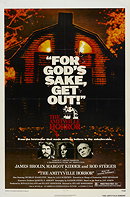
 619
619
 6.1
6.1
 6.2
6.2
